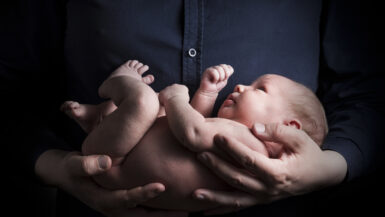Stress is an inevitable part of life, but are its effects limited to adults? Recent studies have highlighted the potential long-term impact of stress on a baby’s development. While parenting brings with it its own set of challenges, being aware of the potential risks that stress can have on a baby’s physical, mental, and emotional development is essential. In this article, we will explore the impact of stress on a baby’s development and how parents can strive to reduce stress levels in their home environment.
Causes of Stress in Babies
Babies experience stress just like adults, even though in different ways. As a newborn, your baby may show signs of stress such as increased irritability, difficulty settling and sometimes even difficulty feeding. As babies get older, they may cry more easily, or become quiet and withdrawn. Knowing the common causes of stress in babies is an important way to diagnose, prevent and treat the effects of stress on your child’s development.
What Causes Stress in Babies?
Although each baby’s experience of stress is unique, there are some common causes of stress and anxiety in babies. For example, a change in routine can be a source of stress, such as introducing solids to your baby’s diet. Separation and unfamiliar settings can also be stressful for a baby, as well as feeling insecure or uncertain.
Physiological Causes of Stress in Babies
Sometimes, physiological factors can also lead to stress in babies. Common physiological causes of stress in infants include hunger, GI distress, and excessive stimulatory noise. Pain and discomfort may also be a source of stress, such as teething, or having a cold or other infection.
Impact of Stress on Baby Development
Stress has a significant impact on a baby’s physical and emotional development, and can even affect the development of the brain. Prolonged or extreme stress can lead to conditions such as depression, anxiety, and difficulty adapting to new situations later in life.
Techniques to Reduce Stress in Babies
Fortunately, there are some techniques you can use to reduce stress and anxiety in your baby. Creating a comfortable and secure environment for your baby is important. Establishing a predictable and consistent routine and engaging in soothing activities such as rocking or singing can also reduce stress in babies. Additionally, providing your baby with the physical comfort and attention they need is key to reducing stress.
Effects of Stress on Infant Development
Stress is a normal part of life, and can contribute to a baby’s development. However, when stress becomes too much, it can have a negative impact on a baby’s development. Stressful events such as a change of caregiver, moving to a new house, or living in an unsafe home can have a detrimental effect on a child’s development and can last into adulthood.
Consequences of High Levels of Stress on a Baby’s Growth and Development
Babies who are exposed to high levels of stress can experience a range of physical and emotional problems. Physical effects may include irritability, fussiness, and difficulties with feeding. Emotional effects may manifest in withdrawal, aggression, and fear. Stress can also lead to disruption in a child’s growth and development, particularly in areas such as communication, motor skills, and behavior.
Risk Factors of Stress on Infant Development
There are a number of risk factors for a baby’s development that can be affected by stress. These include a lack of responsive caregiving, poverty, and exposure to toxins. Environmental stressors such as noise, overcrowding, and lack of support from family and friends can also have a negative impact on a baby’s development.
Stress-Reducing Strategies for Babies
It is important for parents and caregivers to be aware of the potential impact of stress on a baby’s development, and to identify strategies to reduce this stress. There are a number of ways in which parents and caregivers can reduce stress in a baby’s environment. These include providing a safe and secure environment, maintaining a predictable routine, responding quickly to the baby’s needs, and engaging in calming activities such as singing and playing music.
Techniques for Reducing Stress in Infants
Stress can have a profound impact on a baby’s physical, cognitive, and emotional development. Infants, who are yet to develop their own coping mechanisms, are particularly vulnerable to the effects of stress. Fortunately, there are several techniques that can help reduce the amount of stress your infant experiences.
Encouraging A Safe, Nurturing Environment
Creating an environment of warmth and safety is essential for reducing stress in infants. Ensuring that they are regularly fed, held, and comforted will help them feel secure and loved. It’s also important to familiarize your baby with soothing sounds, such as music or a lullaby, as this can help to reduce stress.
Establishing Healthy Routines
Establishing healthy routines like bedtime and mealtime can also help reduce stress in infants. Keeping a consistent schedule can minimize your infant’s feelings of uncertainty, as they will know when it’s time to eat or sleep. Additionally, activities such as tummy time and massage, which can strengthen the bond between you and your infant, should also be incorporated into the daily routine.
Responsive Parenting
Responsive parenting involves really listening to your infant’s needs and responding to them promptly. This can help reduce stress as your baby will learn to trust that you will respond when she cries. Additionally, it’s important to celebrate your baby’s milestones and not push them too hard. This will help to create a positive relationship and teach them to work towards achieving success.
Allowing Time For Unstructured Play
Allowing your infant some time to explore and play with different objects on their own can help to reduce stress and stimulate their creativity. This helps them to develop their motor skills, explore their environment, and learn how to self-soothe. Before they reach six months of age, you can also give them a regular opportunity to enjoy some time in a baby swing or other soothing device.
By providing a safe and nurturing environment, establishing healthy routines, being a responsive parent, and allowing for some unstructured play, you can help reduce stress in your infant. This will in turn help them to develop and grow in a healthy way.
Importance of Stress Management for Baby Development
Stress can have a significant impact on a baby’s growth and development. In the early stages of life, a baby’s environment and the care they receive have an important role in shaping their development, and when this is disrupted due to environmental stressors, it can have a profound effect. In babies, stress can lead to behavioral and cognitive problems, as well as physiological and psychological issues.
Stressors for Babies
Babies can be exposed to a variety of stressors in the early stages of life. These include extreme noise, unfamiliar people, changes in routine, and traumatic events. Other situations such as parental stress or postnatal depression can also cause stress for babies.
Impact of Stress on Babies
Stress in babies can lead to a variety of issues such as sleeping problems, feeding difficulties, and physical manifestations such as increased cortisol levels. In addition to physical symptoms, stress can also lead to behavioral and cognitive issues, such as increased irritability, hyperactivity, and difficulties with concentration and memory.
Importance of Stress Management for Baby Development
It is important to recognize the effects of stress on a baby’s development in order to provide them with the right care and support. Reducing stress levels in the environment is important, both directly through providing a calm atmosphere, quiet environment and consistent routine, and indirectly by addressing underlying causes such as parental stress.
Babies benefit greatly from a loving and supportive environment, with caregivers who respond to their needs with sensitivity and understanding. Taking the time to ensure a calm and nurturing environment, as well as recognizing signs of distress in a baby, are important ways to reduce the impact of stress and help their development.
Babies thrive in a secure and loving environment, and providing them with a calm and consistent environment can help reduce the impacts of stress and foster healthy physical, behavioral and cognitive development.
Long-Term Effects of Stress On Infants
Stress in a baby’s life can have long-term consequences on a baby’s physical, cognitive and emotional development. At a biological level, stress in babies can affect their cortisol levels, which has an effect on the ways their brains and bodies develop. High levels of stress can cause babies to suffer from anxiety and depression as they get older. Cognitively, stress can delay a baby’s capacity for language and memory development. On an emotional level, stress can make babies more susceptible to attachment issues and development of trust.
It is important for parents, caregivers and other adults to be aware of their own stress levels, their interactions with the baby, and the environment in which the baby is growing up in order to create a healthy and safe space for the baby to thrive. Creating a supportive and nurturing environment can help babies cope with stress and develop into healthy adults.





Leave a reply